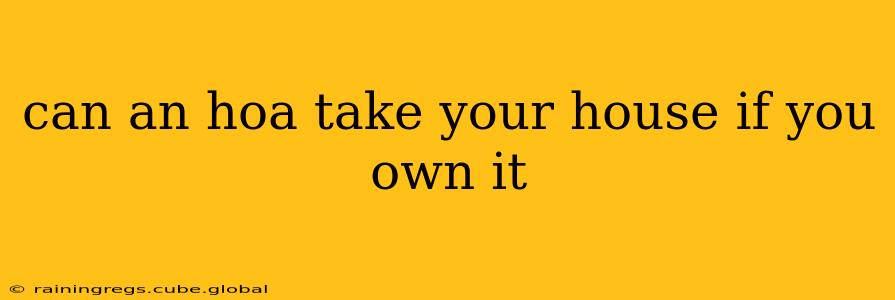Can an HOA Take Your House if You Own It?
The short answer is: generally, no, an HOA cannot directly take your house if you own it. However, they can pursue legal action that could ultimately lead to the loss of your property. This is a complex issue with significant legal ramifications, and it's crucial to understand the process and your rights.
This article explores the circumstances under which an HOA might try to take action against a homeowner, the steps they would take, and how you can protect yourself.
What are the Grounds for HOA Action?
HOAs operate under the authority granted to them by the governing documents of your community—the covenants, conditions, and restrictions (CC&Rs), bylaws, and rules. These documents outline the rules and regulations that all homeowners must follow. Violation of these rules is the primary reason an HOA might take action. Common violations include:
- Architectural violations: Unpermitted renovations, additions, or landscaping changes.
- Maintenance violations: Failure to maintain your property according to HOA standards (e.g., unkempt lawns, exterior paint issues).
- Noise violations: Excessive or disruptive noise.
- Parking violations: Violating parking rules in the community.
- Pet violations: Breaching pet restrictions outlined in the CC&Rs.
- Financial violations: Non-payment of HOA dues or assessments.
How Can an HOA Try to Recoup Losses?
An HOA typically won't seize your home directly. Instead, they'll follow a legal process that might eventually lead to foreclosure. This process generally involves:
- Notices and warnings: The HOA will usually issue a series of notices, giving you the opportunity to rectify the violation.
- Fines: Failure to comply can result in escalating fines.
- Liens: The HOA can place a lien on your property, making it difficult or impossible to sell or refinance your home until the debt is settled.
- Foreclosure: In extreme cases, particularly involving significant financial violations like persistent non-payment of dues, the HOA can pursue foreclosure. This involves a lengthy legal process and requires the HOA to demonstrate significant financial damages.
Can an HOA Evict You?
No, an HOA cannot directly evict you. They control the common areas and the enforcement of community rules but not the ownership of your home. Eviction is a process handled by the courts, typically in response to lease violations. However, a foreclosure resulting from prolonged HOA violations could ultimately lead to you losing possession of your home.
What are My Rights as a Homeowner?
As a homeowner, you have rights. It is imperative to:
- Review your governing documents: Understand the rules and regulations governing your community.
- Communicate with your HOA: Attempt to resolve issues amicably before they escalate.
- Seek legal advice: If you believe the HOA is acting improperly or unfairly, consult with a real estate attorney specializing in HOA disputes.
What Happens After Foreclosure?
If the HOA successfully forecloses on your home due to unpaid dues or other significant violations, the property will be sold at auction to satisfy the debt. You will lose ownership and possession of your home. This is a drastic measure rarely seen and typically only occurs after a long and protracted legal battle.
In conclusion: While an HOA cannot simply take your house, repeated and significant violations can lead to a legal process resulting in the loss of your property. Understanding your rights and responsibilities, as well as the legal avenues available to both you and the HOA, is crucial for maintaining a positive and productive relationship with your community association. Always seek legal counsel if you are facing disputes with your HOA.
